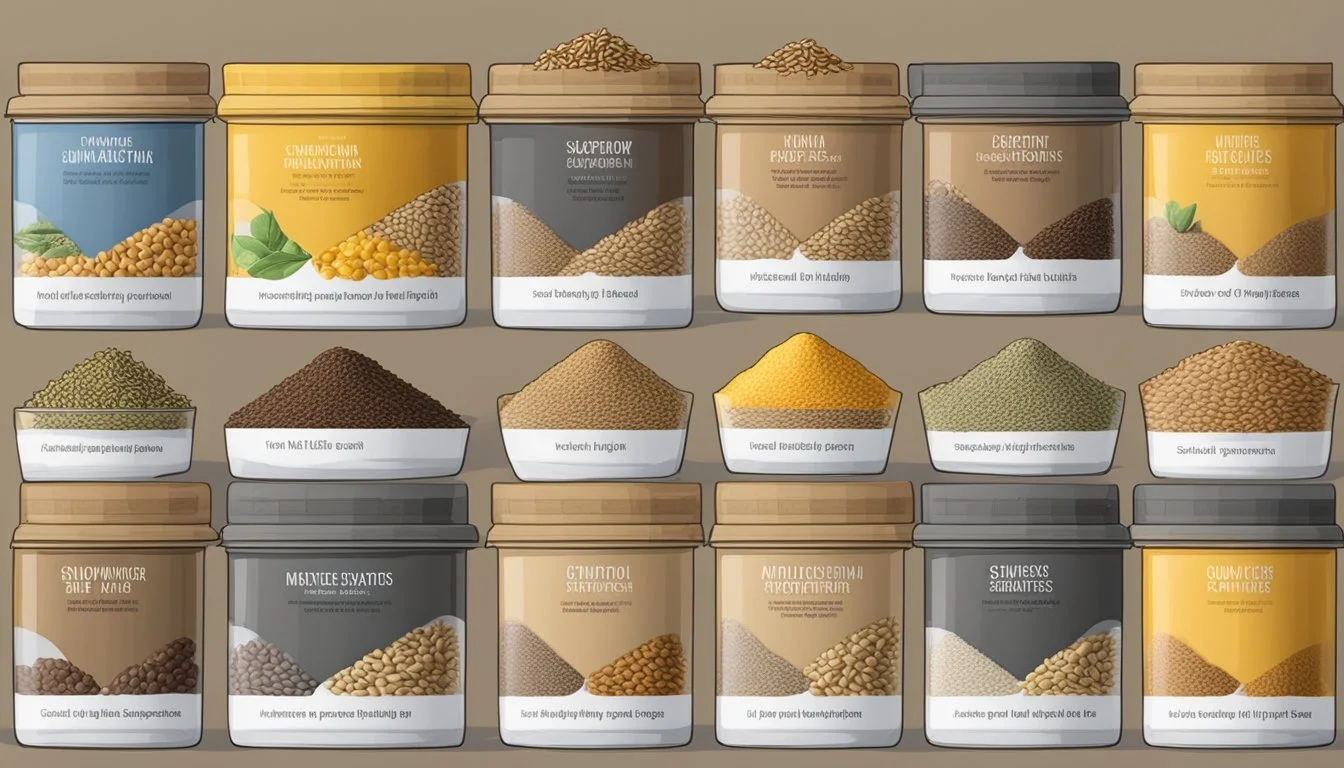Sunflower Seed Substitutes
Top Alternatives for Cooking and Snacking
Sunflower seeds are a popular ingredient known for their mild nutty taste and crunchy texture. They are a staple in many kitchens, often used for their versatility in dishes ranging from salads and breads to snacks and garnishes. However, there are various reasons one might seek a substitute for sunflower seeds, whether due to allergies, availability, or simply a desire to experiment with different flavors and textures.
Fortunately, a wide array of alternatives can fulfil the role of sunflower seeds in most recipes. Pine nuts, for instance, offer a similar buttery texture and are excellent in salads and pesto. Pumpkin seeds, sesame seeds, and flax seeds also provide a comparable crunch and are nutrient-dense options that can easily be incorporated into meals. For a substitute that mimics the heartiness of sunflower seeds, various chopped nuts such as almonds, cashews, and walnuts are excellent choices, especially for baking and as snack toppings.
In seeking sunflower seed substitutes, one must consider the context in which they will be used, as different substitutes may better suit sweet or savory dishes. For snacking and trail mixes, seeds like hemp or poppy can be used, or one might opt for the sweet chewiness of dried fruit as a contrast. Each substitute brings its unique taste and texture, broadening the culinary possibilities while maintaining the integrity of the original dish.
Understanding Sunflower Seeds
Sunflower seeds, produced by the Helianthus annuus plant, are recognized not only for their nutritional benefits but also their versatile use in culinary applications. They provide significant health advantages and come with potential allergen information, various types, and an array of products.
Nutritional Value
The seeds of the sunflower contain substantial amounts of protein and fiber, contributing to a feeling of fullness. They are rich in healthy fats, primarily polyunsaturated fatty acids, including omega-3 fatty acids. In terms of vitamins and minerals, they are an excellent source of vitamin E, magnesium, phosphorus, and folate.
Culinary Uses
In cooking, sunflower seeds are adaptable and can be used across many dishes. They can be roasted for snacking or added to salads for extra crunch. Additionally, sunflower seeds are often found in baking recipes for bread and muffins or as a topping to enhance texture and flavor.
Health Benefits
Consuming sunflower seeds may support heart health due to their high vitamin E and healthy fat content. These seeds are also linked to anti-inflammatory properties and have been suggested to aid in reducing cholesterol levels, making them a healthy choice for a nutritious diet.
Sunflower Seed Allergies
While sunflower seeds are gluten-free, they can still be a source of allergies for some individuals. Symptoms might range from mild to severe, and those with sunflower seed allergies should avoid all forms of sunflower seeds and their derivatives.
Types of Sunflower Seeds
There are mainly two types of sunflower seeds: hulled sunflower seeds, which are the edible kernels found inside the shell, and roasted sunflower seeds, enjoyed as a crunchy snack. Both types serve different uses in various culinary contexts.
Sunflower Seed Products
Products derived from sunflower seeds include sunflower seed butter, an alternative to nut butters, and sunflower oil, used in cooking and frying. Sunflower flour is another product gaining popularity as a gluten-free baking substitute, harnessing the seed's nutritional benefits.
Seed Substitutes Overview
In the search for sunflower seed substitutes, individuals often seek alternatives that mimic the original seed's texture and nutritional profile. Various substitutes may serve different purposes, from cooking to baking, and consideration of these factors is crucial in selection.
Factors When Choosing Substitutes
When one considers replacing sunflower seeds, several factors need to be addressed to ensure that the substitute meets the requirements of the dish or usage. These factors include:
Flavor: The substitute should carry a similar flavor profile or complement the existing flavors of the recipe.
Nutritional Value: The health benefits of sunflower seeds, such as a rich source of vitamins and minerals, should preferably be mirrored in the alternative.
Texture: For baking and cooking, the crunchiness or the mouthfeel that sunflower seeds provide might be essential, and substitutes should mimic this characteristic.
Use in Recipes: How the substitute interacts with other ingredients and behaves under cooking conditions is a significant consideration.
One can opt for a variety of seeds and nuts, such as pumpkin seeds, sesame seeds, flax seeds, and hemp seeds, each providing a unique twist while offering some of the desired characteristics of sunflower seeds. Nut-based options, albeit often larger in size, like almonds, cashews, walnuts, and pecans can also serve as effective substitutes, notably in baked goods where their texture can provide a similar crunch.
Specific Seed Substitutes
When looking for alternatives to sunflower seeds, one should consider the nutritional profile and flavor of potential substitutes. The following seeds offer varying benefits and can be used in an array of recipes, from snacks to baked goods.
Pumpkin Seeds
Pumpkin seeds are an excellent substitute, rich in healthy fats and magnesium. For those seeking an alternative with a robust texture in snacks or salads, pumpkin seeds are the closest match.
Sesame Seeds
Offering a higher calcium content, sesame seeds are suitable for baking and add a mild, nutty flavor. They work well in recipes that call for a slight crunch and can enhance the taste of various baked goods.
Chia Seeds
Chia seeds stand out for their impressive amounts of fiber and omega-3 fatty acids. When utilized as a substitute in dishes, they absorb liquids and develop a gel-like consistency, perfect for puddings or as a binding agent in recipes.
Flaxseeds
Known for their high fiber and omega-3 fatty acid content, flaxseeds are adaptable and can be used in baking. Their ability to act as a binding ingredient makes them a useful component in recipes that require structure and added nutrition.
Hemp Seeds
With significant protein and healthy fats, hemp seeds are a nutritious alternative for sunflower seeds. Their mild flavor and soft texture make them easily incorporated into a multitude of dishes without overpowering other ingredients.
Nut Substitutes
When looking for alternatives to sunflower seeds in your recipes, various nuts can serve as versatile substitutes. These nut options offer distinct flavors, textures, and health benefits fitting for baking, toppings, or snacking.
Almonds
Almonds are a robust choice, rich in healthy fats and Vitamin E. They work well in recipes requiring a crunchy texture and can enhance the nutritional profile of salads and baked goods.
Cashews
Cashews provide a soft texture and a sweet flavor. They're a noteworthy source of protein and magnesium, making them an excellent choice for a vegan protein boost in a variety of dishes.
Pine Nuts
With their delicate, buttery flavor, pine nuts are a favorite for pestos and salads. Although smaller than sunflower seeds, they pack a distinctive punch in both flavor and essential nutrients.
Walnuts
Walnuts are known for their rich omega-3 fatty acids, which are beneficial for heart health. Their intense, earthy flavor imparts depth to baked desserts and bread, as well as to savory dishes.
Pecan Nuts
Pecan nuts offer a sweet, buttery profile suitable for baking and as a topping. Their crumbly texture and taste profile make them a satisfying substitute in cookie recipes and other desserts.
Peanuts
Peanuts are an accessible alternative, providing substantial protein content and a satisfying crunchy texture. Whether roasted or raw, they are great for snacking or adding to savory and sweet dishes.
Chopped Nuts
Chopped nuts of any kind can imitate the desirable crunchy texture of sunflower seeds. They are perfect sprinkled over salads, blended into granola, or used as a crunchy coating.
Poppy Seeds
While not a nut, poppy seeds can step in for sunflower seeds in baking due to their nutty flavor and crunchy texture. They work especially well in breads, muffins, and as a topping for various dishes.
Using Substitutes in Recipes
When cooking or baking, selecting an appropriate substitute for sunflower seeds is vital for maintaining flavor and texture. This section explores the best replacement options for various culinary uses.
Baking with Seed and Nut Substitutes
In baking, it's important to consider a substitute that complements the dish's nutritional profile and flavor. Flaxseeds can be a direct replacement, offering a distinct, yet hearty undertone. For a nuttier essence in baked goods, almonds or pecan nuts can be used. They should be finely chopped to mimic the texture of sunflower seeds. When making a gluten-free flour mix, ground pumpkin seeds are a viable alternative for their rich, savory taste and crunch.
Salads and Toppings
For salads, a variety of seeds and nuts can enhance the dish with a similar crunch and nutrition as sunflower seeds. Pine nuts, with their buttery flavor, make for an excellent topping, as do pumpkin seeds, which provide a more assertive taste.
Common substitutes for sunflower seed in salads are:
Pine nuts: Milder flavor with a soft crunch.
Chopped nuts (almonds, pecans): Offer more significant texture and rich taste.
One can sprinkle these directly onto salads or incorporate them into dressing recipes for an added texture.
Snacking Alternatives
Sunflower seeds are a popular snack due to their satisfying crunch and health benefits. If one is looking for alternatives, hemp seeds offer a nutritious snacking option with a mild, nutty flavor.
Ideal snacking substitutes include:
Hemp seeds: They are small but contribute significant protein content.
Pumpkin seeds: A crunchy and satisfying bite.
These alternatives can be seasoned and roasted similarly to sunflower seeds for a wholesome snack.
Dietary Considerations
When choosing sunflower seed substitutes, one needs to consider dietary restrictions and preferences such as veganism, and low-carb diets like paleo and keto. Opting for the right substitute can ensure dietary needs are met without compromising on nutrition or flavor.
Vegan Alternatives
Vegan diets exclude animal products, making plant-based seeds an excellent sunflower seed replacement. Hemp seeds and chia seeds are both suitable vegan options. They are gluten-free and offer a host of nutritional benefits, including being rich in healthy fats and protein.
Hemp seeds: Provide omega-3 fatty acids and are easily sprinkled on dishes.
Chia seeds: High in fiber and can be used to create a gel-like consistency when mixed with liquids, making them a versatile ingredient in vegan cooking.
Additionally, sesame seeds or tahini (sesame seed paste) can be used in a variety of vegan recipes, from dressings to baking.
Paleo and Keto Options
The paleo diet focuses on whole, unprocessed foods, while the keto diet prioritizes high-fat, low-carbohydrate foods for energy.
Pumpkin seeds: Fit well within both paleo and keto guidelines and are rich in magnesium, a nutrient beneficial for heart health.
Almonds and pecans: As nut-based substitutes, they are low in carbohydrates and high in healthy fats, aligning with keto requirements.
For those strictly adhering to paleo or keto diets:
Substitute Paleo-Friendly Keto-Friendly Nutrient Highlight Pumpkin seeds Yes Yes Magnesium Almonds Yes Yes Vitamin E Pecans Yes Yes Healthy fats
It's important to consider the specific macronutrient ratios for keto dieters to maintain ketosis. While these substitutes are healthy, portion control is key to staying within dietary goals.





